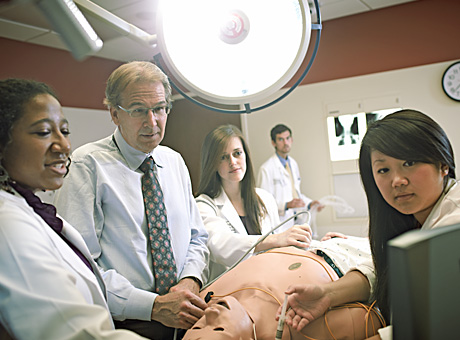
Teaching and inspiring: David J. Murray, MD, the Carol B. and Jerome T. Loeb Professor of Anesthesiology, helps students develop good judgment and problem-solving diagnostic skills in the Howard and Joyce Wood Simulation Center.

Teaching and inspiring: David J. Murray, MD, the Carol B. and Jerome T. Loeb Professor of Anesthesiology, helps students develop good judgment and problem-solving diagnostic skills in the Howard and Joyce Wood Simulation Center.
In medicine, knowledge, experience, and inspiration is passed from one generation to the next in a grand continuum. Washington University is committed to providing its students with a rigorous foundation in science, advancing the tools needed to diagnose and treat patients, and developing the ethical basis for making critical decisions in a rapidly changing health care environment. Attracting the best students and faculty, with the support of alumni and friends, represents a partnership for the future.
Areas of excellence
To secure the future of our leadership in medical education, it is imperative to increase the number of endowed professorships for clinical and basic science faculty, as well as professorships for preceptors, those clinicians who provide hands-on training to students. An endowed professorship is often a crucial factor in an individual’s decision to join the School of Medicine faculty. These professorships — which provide support for salary, benefits, and research needs — are central to retaining our most promising faculty and recruiting stellar outside leaders.
We continue to seek support for scholarships to address the cost of education, reduce debt upon graduation, and recruit the best students. Medical, occupational therapy, physical therapy, and audiology students have been the primary beneficiaries of these scholarships; we are extending our efforts to include students in the Medical Scientist Training Program and the Division of Biology and Biomedical Sciences.
The partnerships our faculty and students form with our generous donors are often warm and enduring. Endowed professorships can serve as the foundation for lifelong collaboration between faculty and donors in the advancement of medicine. The joy of providing a student scholarship, meeting the student who receives it, learning about the student’s aspirations, and knowing that one has played an important role in shaping the future of medicine can be very rewarding for donors. For students, this relationship often inspires them to make a commitment to continue the tradition of philanthropic support when they are positioned to do so.
Together, we can
recruit and empower the brightest faculty and most gifted and creative graduate students.
advance our leadership in both innovative learning methods and in adapting teaching resources to meet the changes in medical knowledge and practice.